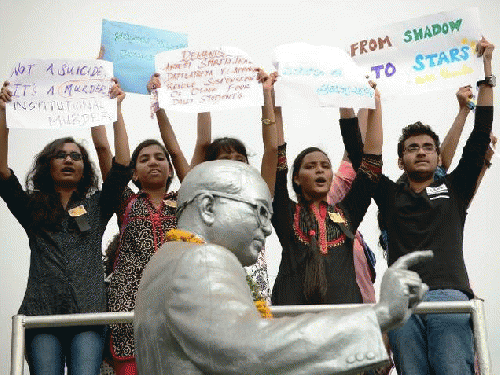
|
SHARE |
|
Prakash Kona is a writer, teacher and researcher who lives in Hyderabad, India. He is currently Professor at the Department of English Literature, The English and Foreign Languages University (EFLU), Hyderabad.
OpEdNews Member for 800 week(s) and 5 day(s)
52 Articles, 0 Quick Links, 38 Comments, 1 Diaries, 0 Polls
Articles Listed By Date
List By Popularity
List By Popularity
(2 comments) SHARE  Monday, April 23, 2018
Monday, April 23, 2018
What women need are social equality and economic justice and not just more laws Gender issues are connected to social and economic justice and not merely about having more laws to punish violators. Legal empowerment is the tip of the iceberg and the easiest in my view because then nobody needs to do anything.
What women need are social equality and economic justice and not just more laws Gender issues are connected to social and economic justice and not merely about having more laws to punish violators. Legal empowerment is the tip of the iceberg and the easiest in my view because then nobody needs to do anything.
SHARE  Saturday, April 14, 2018
Saturday, April 14, 2018
Horrific Images of BJP-misrule of India The 18-year old girl raped by the brothers, one of them a member of the ruling party in power and the gruesome rape and murder of the 8-year old in Jammu and Kashmir are images of BJP-misrule of India.
Horrific Images of BJP-misrule of India The 18-year old girl raped by the brothers, one of them a member of the ruling party in power and the gruesome rape and murder of the 8-year old in Jammu and Kashmir are images of BJP-misrule of India.
(1 comments) SHARE  Friday, March 23, 2018
Friday, March 23, 2018
Why Indians are obsessed with the private lives of actors It's unbelievable how much interest Indians take in the private lives of actors. The context of course to what I am saying is the recent, unfortunate death of the actress Sridevi, perhaps one of the most popular women actors ever on the Indian screen.
Why Indians are obsessed with the private lives of actors It's unbelievable how much interest Indians take in the private lives of actors. The context of course to what I am saying is the recent, unfortunate death of the actress Sridevi, perhaps one of the most popular women actors ever on the Indian screen.

(1 comments) SHARE  Monday, February 26, 2018
Monday, February 26, 2018
The Politics of India's PM, Narendra Modi Narendra Modi's formula for an "exam warrior" in politics has been unbelievably simple: communalize the masses and corporatize the government. Almost every social group has begun to adopt reactionary positions either as supporters or as opponents of Modi and his policies. India as a nation has never been as polarized along communal lines as it is now since the
The Politics of India's PM, Narendra Modi Narendra Modi's formula for an "exam warrior" in politics has been unbelievably simple: communalize the masses and corporatize the government. Almost every social group has begun to adopt reactionary positions either as supporters or as opponents of Modi and his policies. India as a nation has never been as polarized along communal lines as it is now since the
SHARE  Saturday, February 24, 2018
Saturday, February 24, 2018
God's own Country, Kerala, where God is fast asleep The pictures of the poor mentally challenged tribal man from Kerala who was lynched for supposedly stealing rice are haunting to say the least. That look of utter vulnerability written all over his body tells us the story of human injustice and human suffering in the same breath.
God's own Country, Kerala, where God is fast asleep The pictures of the poor mentally challenged tribal man from Kerala who was lynched for supposedly stealing rice are haunting to say the least. That look of utter vulnerability written all over his body tells us the story of human injustice and human suffering in the same breath.

SHARE  Wednesday, December 27, 2017
Wednesday, December 27, 2017
Have a Nice Day in a Post-Joke World I want to touch on one episode from the 16th Season of Family Guy with the title "The D in Apartment 23" about Brian's racist tweet which I found interesting for its take on political correctness. Political correctness is a disease that unfortunately is connected to Internet-related developments which created a parallel social world other than the ones where people actually meet and discuss in day to day life.
Have a Nice Day in a Post-Joke World I want to touch on one episode from the 16th Season of Family Guy with the title "The D in Apartment 23" about Brian's racist tweet which I found interesting for its take on political correctness. Political correctness is a disease that unfortunately is connected to Internet-related developments which created a parallel social world other than the ones where people actually meet and discuss in day to day life.

(10 comments) SHARE  Saturday, September 16, 2017
Saturday, September 16, 2017
On being Definitionally Challenged People who tend to use language without telling us what parameters they associate with the words they use, I have decided to call them "definitionally challenged"... to these abusers of language I have only one thing to say: read Rumi, Shakespeare and Wittgenstein.
On being Definitionally Challenged People who tend to use language without telling us what parameters they associate with the words they use, I have decided to call them "definitionally challenged"... to these abusers of language I have only one thing to say: read Rumi, Shakespeare and Wittgenstein.

(3 comments) SHARE  Wednesday, June 7, 2017
Wednesday, June 7, 2017
Why the ISIS is winning in Europe In the brutal war in Syria and in Iraq where either you murder or you get murdered it is most likely that the ISIS is losing the war on the ground, which may be one good reason why they are determined to prove their newsworthiness in Europe or the US. ISIS needs propaganda to achieve its goals as much as the west does to defeat them.
Why the ISIS is winning in Europe In the brutal war in Syria and in Iraq where either you murder or you get murdered it is most likely that the ISIS is losing the war on the ground, which may be one good reason why they are determined to prove their newsworthiness in Europe or the US. ISIS needs propaganda to achieve its goals as much as the west does to defeat them.
SHARE  Wednesday, November 30, 2016
Wednesday, November 30, 2016
The Myth of a Cashless Society I wonder if PM Narendra Modi understands the gravity of the disaster unleashed on the poor masses thanks to the overnight project of demonetization. The ex-PM Manmohan Singh is right in calling it "organized loot" and "legalized plunder" except that the neo-liberal economic reforms which turned loot and plunder into virtues were initiated when Mr. Singh began his term as the Minister of Finance in 1991.
The Myth of a Cashless Society I wonder if PM Narendra Modi understands the gravity of the disaster unleashed on the poor masses thanks to the overnight project of demonetization. The ex-PM Manmohan Singh is right in calling it "organized loot" and "legalized plunder" except that the neo-liberal economic reforms which turned loot and plunder into virtues were initiated when Mr. Singh began his term as the Minister of Finance in 1991.
(1 comments) SHARE  Friday, September 30, 2016
Friday, September 30, 2016
The Writing on the Kashmiri Wall The writing on the Kashmiri wall is obvious to those who have eyes to see: either we create an inclusive order that is willing to accommodate the aspirations of the common people of Kashmir or we end up buying the loyalty of the elites with the Indian tax-payer's money and becoming brutally repressive with the masses in the way Israel operates while dealing with the Palestinian Territories.
The Writing on the Kashmiri Wall The writing on the Kashmiri wall is obvious to those who have eyes to see: either we create an inclusive order that is willing to accommodate the aspirations of the common people of Kashmir or we end up buying the loyalty of the elites with the Indian tax-payer's money and becoming brutally repressive with the masses in the way Israel operates while dealing with the Palestinian Territories.
SHARE  Saturday, April 9, 2016
Saturday, April 9, 2016
What I think of Student Nationalists from the National Institute of Technology, Kashmir Wearing a badge of nationalism has never been a serious indication that someone loves their country. Those who love their country feel with its downtrodden classes and its oppressed women and children. They are not blind with hatred that destroys the soul. They think of innovative ways to make life meaningful for everyone who comes in contact with them especially those who are ostracized or without a home.
What I think of Student Nationalists from the National Institute of Technology, Kashmir Wearing a badge of nationalism has never been a serious indication that someone loves their country. Those who love their country feel with its downtrodden classes and its oppressed women and children. They are not blind with hatred that destroys the soul. They think of innovative ways to make life meaningful for everyone who comes in contact with them especially those who are ostracized or without a home.

SHARE  Sunday, March 13, 2016
Sunday, March 13, 2016
What it means being Indian Each group of people imagines a characteristic or a set of traits that they feel intrinsically defines who they are. That makes Indianness fundamentally not so different from Pakistanness or Nepalness or Americanness
What it means being Indian Each group of people imagines a characteristic or a set of traits that they feel intrinsically defines who they are. That makes Indianness fundamentally not so different from Pakistanness or Nepalness or Americanness
SHARE  Wednesday, February 17, 2016
Wednesday, February 17, 2016
Lives Matter: Black or White When I read about "Black Lives Matter," the question that came to mind was: shouldn't they matter! And it wasn't a rhetorical response. The next question that came to mind was: do other lives, whether white or not-so-white, Jew or Arab, ought to matter as much as black lives! Yes, they do! Black lives do matter. Black lives should matter, but, more importantly, black lives also matter, as do other lives.
Lives Matter: Black or White When I read about "Black Lives Matter," the question that came to mind was: shouldn't they matter! And it wasn't a rhetorical response. The next question that came to mind was: do other lives, whether white or not-so-white, Jew or Arab, ought to matter as much as black lives! Yes, they do! Black lives do matter. Black lives should matter, but, more importantly, black lives also matter, as do other lives.

SHARE  Tuesday, February 2, 2016
Tuesday, February 2, 2016
Universities are Superstructures, not the Substructure of Society The suicide of a Dalit student at the University of Hyderabad,India and the politics surrounding the response that the suicide generated. The role that students play as a pressure group, or rather as a lobby, in their "compulsory revolutionary service."
Universities are Superstructures, not the Substructure of Society The suicide of a Dalit student at the University of Hyderabad,India and the politics surrounding the response that the suicide generated. The role that students play as a pressure group, or rather as a lobby, in their "compulsory revolutionary service."

